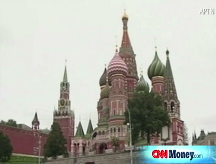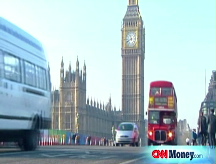Throwing the bathroom sink at the economy
As stocks plunge around the world, talk of radical solutions to fix the economy swirl. But it may be too late to undo the damage done by the credit crisis.
NEW YORK (CNNMoney.com) -- Governments and central banks of the world's leading nations have taken unprecedented coordinated actions in the past month to help out battered financial markets and economies around the globe.
Yet, the global meltdown in stocks continued Friday. And this lack of confidence and sense of panic has left experts wondering what can be done next to assure investors and get banks to operate normally once again.
"They've already thrown the kitchen sink at the problem," said Lakshman Achuthan, managing director of the Economic Cycle Research Institute. "I guess the next step is the bathroom sink."
More rate cuts by central banks seem to be almost a certainty at this point. But there's only so much farther the Federal Reserve can go. The federal funds rate is now 1.5% and many investors think the Fed will lower it to 1% after its two-day meeting that ends next Wednesday.
Some investors are even betting the Fed will cut rates by three-quarters of a percentage point to 0.75%, which would mark the first time rates were ever below 1%.
There is also more talk than ever before of the U.S. central bank lowering rates to 0% if financial markets do not improve soon. But economists suggest that a cut to 0% would do little to get credit flowing when compared to the moves already made by the Fed.
"The Fed's intention is very clear. They're prepared to flood the economy with money," said Sung Won Sohn, economics professor at Cal State University Channel Islands.
The Bank of Japan cut its benchmark rate to just about zero and left it there for much of the 1990s. But that did little to end a decade-long economic slump there. Rates in Japan today are 0.5% so Japan also has little room to cut.
The European Central Bank's rate is 3.75%, while the Bank of England's rate stands at 4.5%. If both cut rates next week in coordination with the Fed, it's possible they could follow with additional cuts of their own the following week.
The Fed has stepped up its lending to banks through a relatively new program known as the term auction facility and is now allowing Wall Street firms to borrow directly from the Fed through its discount window.
It has also tried to get credit flowing by announcing plans to lend perhaps $1 trillion or more to major businesses through the use of commercial paper, the primary form of borrowing those large companies use to fund their day-to-day operations.
Some economists say what's needed next are direct Fed loans to an even broader range of businesses that are not large enough to issue commercial paper.
Former Federal Reserve Governor Lyle Gramley has suggested the Fed could do so by guaranteeing a wide range of loans to small and large businesses with liberal underwriting standards.
Robert Brusca of FAO Economics said the Fed's district banks could make their own direct loans to businesses.
"When you tell businesses you're going to be there for them, you're also telling banks 'There's not that much risk for you,'" said Brusca.
Of course, the Fed alone can't fix the struggling U.S. economy. Congress is holding hearings to discuss a new round of economic stimulus, which could include loans or other help to state and local governments that are facing layoffs due to sudden budget short falls.
The Treasury Department has authority from Congress to pump $700 billion into the financial sector and it has already used that newly-passed law to make $125 billion in investments in nine of the nation's largest banks.
According to published reports Friday, the Treasury Department is close to announcing that other banks will soon receive investments and is also said to be considering taking equity stakes in insurance companies.
Other experts argue that the government will also soon have to bail out the nation's cash-starved automakers in order to save that industry.
American banks, insurers and other industries aren't the only ones around the world in need of assistance either. The credit crisis is now clearly a global phenomenon.
The International Monetary Fund, which is essentially funded by the United States, Europe and Japan, is in talks to provide loans to help prop up the currencies and economies of Hungary, Iceland, Pakistan, and Ukraine.
The IMF also disclosed Wednesday that it was about to start discussions with Belarus.
Jay Bryson, international economist at Wachovia, said more countries are likely to need help from the IMF. And he added that the size of these rescues are also probably going to be much greater than in the past.
"[The IMF has] already said [it] would allow countries to borrow up to four times their previous quotas," he said.
One of the most radical ideas to help end the credit crisis was suggested by Nouriel Roubini, professor of economics at the Stern School of Business at New York University.
Roubini gave a speech in London Thursday suggesting that world financial markets might need to be shutdown for a week or two to stem the ongoing panic.
On Friday morning, he added that Russia's decision on Friday to shut down the Moscow stock market until Tuesday was a sign that shutting markets was no longer an unthinkable option.
"We have reached the scary point where the dysfunctional behavior of financial markets has destructive effects on the financial system and - much worse - on the real economies," he wrote in a note Friday morning. "So it is time to think about more radical policy actions and government interventions."
Other experts said such a step is unlikely to be taken. But they conceded it was far more of a possibility than they would have thought until very recently.
"If you had said this four weeks ago, we all would have laughed. But clearly a lot of things have happened over the last four weeks," said Bryson. "Now the most I can say is it's a measure of last resort."
But other economists say it's not clear the fall in global stocks and problems in financial markets can be stopped any time soon, regardless of what actions the Fed and other central banks take in the next few days.
That's because the damage already done by the credit crisis will lead to tighter credit and a drop in corporate earnings and stock prices. Further declines in U.S. home prices are also likely, which will only create more losses in the financial sector.
"There's room for another 30% fall in the stock market given the forecasts on earnings," said Christian Nenegatti, lead analyst for RGE Monitor, a New York economic research and analysis firm. "It doesn't look like you can be bearish enough in this environment." ![]()




